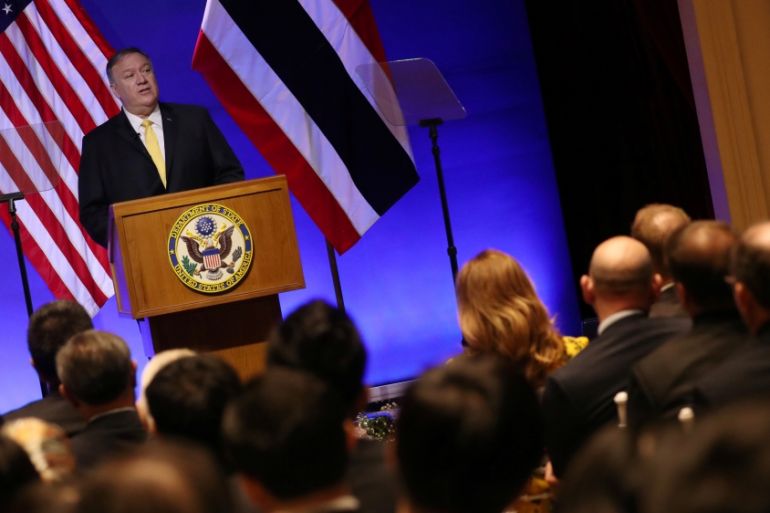Pompeo rips into China as Trump slaps new tariffs on Beijing
US secretary of state urges Asian countries to shun China until it revamps its ‘protectionist’ and ‘predatory’ policies.

US Secretary of State Mike Pompeo has criticised China for what he described as predatory trade practices and human rights abuses that harm economic development.
Serving up a sharp rebuke on China’s drive into Southeast Asia, Pompeo said on Friday: “We’re not building roads to pave over your national sovereignty … We don’t fund bridges to close gaps of loyalty.”
Keep reading
list of 4 itemsUS imposes new sanctions on Iran after attack on Israel
A flash flood and a quiet sale highlight India’s Sikkim’s hydro problems
Why is Germany maintaining economic ties with China?
Pompeo also told the business and political leaders gathered in Bangkok that Asian nations are best served by private American rather than “state-led” investment.
|
|
He told the Siam Society that “trade and freedom” are the keys to development and urged countries in the region to shun China until it reforms its practices.
His speech came hours after President Donald Trump promised to slap 10 percent of new tariffs on $300bn worth of Chinese goods in a sharp escalation of the trade war between the two superpowers.
“Our investments don’t serve a government … (they) don’t serve a political party,” he said of the Chinese Communist Party.
Washington has already imposed tariffs of 25 percent on $250bn worth of Chinese goods over complaints Beijing steals or pressures companies to hand over technology.
Beijing retaliated with tariffs on $110bn of American goods, including agricultural products, in a direct shot at Trump supporters in the US farm belt.
Reacting to the news, Chinese Foreign Minister Wang Yi was quoted by the South China Morning Post as saying that the decision to slap China with new tariffs “is definitely not a constructive way to solve the economic and trade frictions. It is not a correct way.”
Hands-off on Hong Kong
Beijing considers Southeast Asia as its “neighbourhood” where its economic, political and military might have given it primacy, with massive infrastructure and investment schemes across the region.
But smaller powers also accuse China of loading on debt, as well as aggression in the disputed South China Sea where a military build-up threatens the claims of several nations to strategically crucial waters.
The US wants the South China Sea, one of the world’s most important shipping lanes, to remain open.
In short panel comments after his speech, Pompeo also accused China of “protectionism” and “predatory tactics” to give its companies an advantage in global markets.
|
|
“China has taken advantage of trade … It’s time for that to stop,” he said.
“I think that’s what you saw this morning,” he added, referencing Trump’s latest barrage of tariffs on Chinese goods.
Unlike earlier tariffs, which were meant to minimise the effect on ordinary Americans by going after industrial goods, the new ones would affect a wide range of consumer products.
Meanwhile, Pompeo stuck to Washington’s position of non-interference on the massive anti-government protests engulfing Hong Kong, a Chinese territory.
“I hope that the way things will proceed in Hong Kong … will be non-violent.”
Asked what the US response would be in the event of Chinese military intervention in the financial hub, he said: “One thing this administration has been really good about is not tipping our hand to what we will or won’t do. And I’m going to do that here this morning.”
But he also noted earlier that the current unrest in Hong Kong is indicative of problems caused by authoritarian rule. And he noted that China’s economy had entered a “new normal of slower growth.”
On Thursday, Trump also said that he was taking a hands-off approach with Beijing in Hong Kong.
“That’s between Hong Kong and… China,” Trump told reporters at the White House. “They don’t need advice.”
Pompeo is in Bangkok to attend the Association of Southeast Asian Nations (ASEAN) foreign ministers meeting.